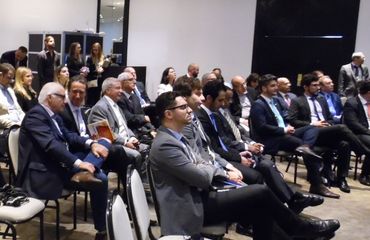São Paulo – The twenty members of the business mission headed by the Dubai Chamber of Commerce and Industry (Dubai Chamber) to Latin America arrived in São Paulo on Saturday (15) with a well-defined goal: to officially open the Dubai Chamber’s local office, the eighth outside the United Arab Emirates.
The office in São Paulo will be responsible for all the business done by the Dubai Chamber in the country and Latin America, a region seen by the officials of the Dubai Chamber as highly promising for business. Last year, trade between the emirate and Latin American countries, minus oil trade, reached USD 4.7 billion, with Brazil accounting for a third of the amount, according to data from the Dubai Chamber.
“It’s a very important region for us,” said Hamad Buamim, president and CEO of Dubai Chamber this Monday (17) in a meeting organized by the Arab Brazilian Chamber of Commerce. “Almost everyone in the mission that came from Dubai is in Latin America for the first time. We want to better understand this market and assess the opportunities we can find here,” he explained.
Business owners from ten Dubai companies, from sectors such as logistics, agribusiness, retail and free zones, are taking part in the mission. In addition to São Paulo, where they stayed until this Tuesday (18), they will visit Paraguay and Argentina. The aim is to better integrate Latin America with Dubai and the Gulf region as a whole.
Since it’s the first visit for the majority of the members, the mission is focusing more on knowledge. Buamim said that no deals were closed during the visit to Brazil, although he admits that some negotiations are advanced.
The executives met on Monday morning with São Paulo mayor João Dória (from political party PSDB) – who visited Dubai two months ago. They also had lunch with business owners from the Federation of Industries of the State of São Paulo (Fiesp) and in the afternoon they met with the São Paulo state vice governor Márcio França (from PSB). In the evening, the mission had a meeting at the Arab Chamber.
To Rubens Hannun, president of the Arab Chamber, the visit by Dubai business owners strengthens the partnership between both Chambers. “The Dubai Chamber office in São Paulo boosts the confidence between both sides, benefiting our relations. For Brazilians, Dubai is of strong interest, as well as the other Arab countries, but our contact with the emirate is very tight. So the reaffirming of our partnership is very nice. And the visit in return for ours happened very quickly, since we were there less than two months ago, at Gulfood,” he said.
Hannun visited Dubai in February during Gulfood, the food industry trade show, when he met with representatives from the Dubai Chamber.
The president underscored also the hiring by the Dubai Chamber of executive João Paulo Paixão, who is leaving the Arab Brazilian Chamber of Commerce to take the job. “This just shows the great integration between both sides. I congratulate the Dubai Chamber on the hiring of João Paulo and congratulate him for the new stage in his career,” he said.
Opportunities
The Dubai Chamber’s CEO highlighted the opportunities presented by mayor João Dória in the real estate sector, especially the privatizations that the politician plans to carry out in São Paulo. “We can definitely promote some of these projects not only in Dubai or in the UAE, but throughout the region,” said Buamim, recalling the visit the mayor paid to the country early in the year. “It was an excellent meeting. We confirmed our expectations that there’s a good business partnership with Dubai.”
The Arab executive announced the opening of the office to vice governor Márcio França, to whom he had promised it in a meeting held three years ago. “We also talked about the opportunities between the two states. We believe that there are good potential deals in the agriculture and food sectors, especially in processed foods,” he added.
Other sectors mentioned by the Dubai Chamber were logistics, renewable energy, tourism and manufacturing, highlighting the auto, chemical, textile, aeronautic, pharmaceutical and metal sectors.
*Translated by Sérgio Kakitani




